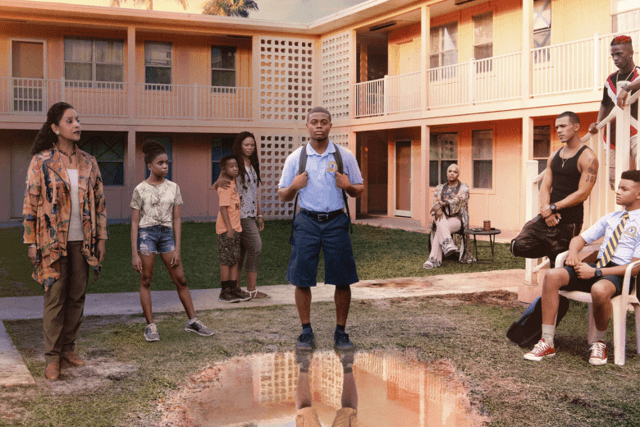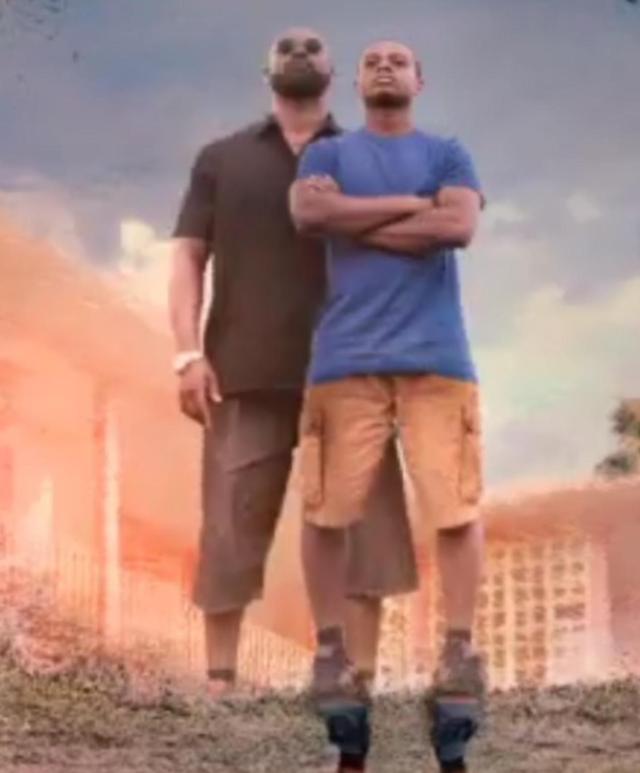- by New Deal democrat
“Well, we all have a face
That we hide away forever
And we take them out
And show ourselves when everyone has gone”
- Billy Joel, “The Stranger”
“No one here is exactly what he appears.” - G’Kar, Babylon 5
“No one here is exactly what he appears.” - G’Kar, Babylon 5
“David Makes Man” is a loosely autobiographical coming of age drama created bt Terell Alvin McCraney, (executive produced in part by Oprah Winfrey) centered on the academically gifted 14 year old African American “David,” who lives in the projects of Homestead, Florida with his single mother and his little brother. His father, who he has never met, is a college professor with whom his mother, when a student, had a brief affair. During the day, he attends a magnet school where he is known at “DJ.” To the drug-dealing gang members at “the Ville,” as the housing project is known, he is “Dai”:

Those alternative names are a sign of the central theme of this drama. For, pace Billy Joel, David wears different faces that he takes out depending on the circumstances. Sometimes the alternative “Davids” appear physically - in fact, it isn’t entirely clear that David doesn’t suffer from dissociative disorder, a la “Mr. Robot.” His mentor is a drug dealer named “Sky” who shows up not only in the projects but also, oddly, along David’s bus ride to school, and urges him to betray his best friend at school, saying “the first kill is the hardest.” We learn Sky’s secret at the end of the pilot episode.
Between the abject poverty of David’s family - the electricity and the phones in their apartment have been turned off depending on which bill his mom has paid - and David’s need to overperform at school in order to get into the prep high school he desires, his life is a constant pressure cooker of tension, and at times David looks like he is about to physically explode. Several of the adults in his life note that he always pauses before he answers a question, and in a few scenes we actually see his internal mental gyrations as he wrestles with what information if any he should give out. And it is easy to see why: people make mistakes, and in the extremes of poverty, any mistake can have disastrous, even fatal, consequences.
There is another element in duality in the series as well: it isn’t clear at all whether David is a hero or an anti-hero. There are strong elements of both “Breaking Bad” and even “The Godfather” in David. He agrees to serve as a look-out for the drug dealers during the pilot, and later on, steals a scrip pad. And I wouldn’t trust him any more than I would trust Michael Corleone - he has the ability to straightforwardly and earnestly tell a blatant lie. Later in the season, there is even a scene between David and Sky’s son Raynan, one of the drug dealers, which recapitulates the scene in The Godfather where Michael rather than Sonny is shown to be the strategic master in the crime family. In short, it’s not clear at all which path David is going to ultimately choose.
But what I like the best about this series is how three-dimensional the characters are. As G’Kar warned in the 1990s science fiction series Babylon 5, nobody is exactly what they appear. For example, the drug dealers aren’t two dimensional bad guys, but fully realized personalities with humane and even tender sides. Raynan is jealous of the mentoring Sky did for David, but also tells David that he views him like the little brother he never had, and genuinely reaches out to help him. The toughest of the drug dealers, Shinobi, is revealed to have a big secret of his own, and later in the season we will see him reduced to shocked immobility in grief, as well as putting on a respectful, polite face in a discussion with an elderly white woman in a pharmacy’s waiting room. There is also a football lineman-sized drag queen who has taken in a 17 year old trans runaway, even though he could get charged with kidnaping, or worse.
Even the authority figures at school are conflicted. For example, his advanced placement teacher, played by Phylicia Rashad, saves David from a dream-ending suspension in the first episode, but never lets him know it, and in fact, treats him like dirt relentlessly to his face.
Then there’s his biracial friend, Seren, who lives in a dream suburban home, with his unbelievably bigoted and severe white mother and his successful black stepfather. It is a secret about his stepfather that triggers the fight between David and Seren at school in the opening of the pilot episode. Why that is we only find out clearly at the end.
It is in the context of betraying Seren that Sky tells David that “the first kill is the hardest,” meaning that the high school he wants to go to will probably only take one of the two of them. Ominously, Sky whispers that advice again into David’s ear at the end of the episode, suggesting that if not Seren, somebody else is going to figuratively if not literally be killed by David in pursuit of his ambition later on.
“Making man” I have learned, is slang for turning 18 years old. David faces a slew of decision points in his life, where he must ultimately choose which is going to be his “real” face. This is a richly textured drama that hooked me in the first 15 minutes I watched, and I unhesitatingly recommend it to you.
Episode 7 of the first season will be shown on the OWN network Wednesday night. Most prior episodes are available on demand, and the pilot episode can be streamed for free on YouTube.
———
UPDATE: There is lots of imagery in the series about David “coming from water.” That David’s image is reflected in a water puddle in the above poster is no accident. If you look carefully, you can see that what appears in the water is not an exact mirror image. There is a version where the entire reflection is shown, and an animated one where Sky appears and disappears. Here it is, and it is ominous:
This is an older David who is very much the successor to Sky. Of course, the more charitable interpretations is that it is just the stronger and more confident older self that David wants to be.
